Ayuba Philip1, Abdul Christopher Ileanwa2, Abdulrahman Mukaila El-Hussain1
1Department of Architecture, School of Environmental Technology, Federal University of Technology, Minna, Nigeria
2Department of Architectural Technology, School of Environmental Technology, Kogi State Polytechnic Lokoja, Nigeria
Correspondence to: Abdulrahman Mukaila El-Hussain, Department of Architecture, School of Environmental Technology, Federal University of Technology, Minna, Nigeria.
| Email: |  |
Copyright © 2018 The Author(s). Published by Scientific & Academic Publishing.
This work is licensed under the Creative Commons Attribution International License (CC BY).
http://creativecommons.org/licenses/by/4.0/

Abstract
The availability of adequate student facilities in Universities generally and hostels in particular is one of the key factors that have effects on the overall academic performance of students on campuses of institutions of higher learning. The social integration of students contributes to the overall satisfaction of students. The hostels in the Federal Universities of Nigeria and North Central in particular are not measuring up to the modern needs of students in the provision of students housing and it is not certain that Post-Occupancy Evaluation has been carried out as regard to hostel users' needs. The study assessed student’s facilities in hostels of Federal Universities in North Central Nigeria with the aim of reviewing the present status of student hostels in order to improve on students living conditions. The data was gathered by the use of questionnaire and observation schedule and the SPSS software was used to analyze the results. The research concludes that overcrowding, inadequate spaces, non -availability of recreational spaces and lack of internet services are challenges in hostels. The study recommends that there should be a periodic Post Occupancy Evaluation of the facilities in hostels of Federal Universities, to determine the adequacy and state of the facilities for improvement where necessary.
Keywords:
Facilities, Satisfaction, Students hostel, Universities
Cite this paper: Ayuba Philip, Abdul Christopher Ileanwa, Abdulrahman Mukaila El-Hussain, Post-Occupancy Evaluation of Students Hostel Facilities in Federal Universities in North Central, Nigeria, Architecture Research, Vol. 8 No. 4, 2018, pp. 123-128. doi: 10.5923/j.arch.20180804.02.
1. Introduction
The Student Hostel is an accommodation that is specifically designed to accommodate students, such as a ‘live-in’ residential college, boarding house or other purpose built development containing student units with other combined ancillary facilities which includes; study areas, communal lounge, laundry, toilets and kitchens (Sharma, 2012). This purposely form of development is assessed as student accommodation or a boarding house. The essence of hostel accommodations is for students to have focus on their education without any kind of side attractions. The student on-campus housing has been described as the bulk of the universities built environment as it represents the largest facility asset of an institution (Amole, 1997).A general observation shows that the hotels in the Federal Universities in Nigeria and North Central in particular are not measuring up to the needs of the students due to the age of the hostel buildings and the annual increase in student population. Consequently, public universities, especially those in the north central region of Nigeria have not been able to provide hostel accommodations while the existing hostels are in poor conditions due to the student population. The universities in Nigeria are classified as first, second, third and fourth generations. The first generation universities were those established in the 1960s, the second were those established in 1970s, third were those established in the 1980s, the fourth were established in the 2000s (NUC, 2003). The fourth generation universities comprise of private, state governments and Federal government universities. The fourth generation set of universities witness the emergence of many privately owned universities. There are seven federal universities in the north central region of Nigeria. The breakdown shows that each of the states in this region has a federal university including Abuja. The federal universities under investigation in this region are first, second and third generation set of universities in the region. The age of the hostel buildings necessitates the need for a Post-Occupancy Evaluation (POE) in order to ascertain the students’ needs. These hostels were conceived and designed with standards that conformed to the demand of the generation to which the universities belong. The technological advancement which has been unfolding many ways of doing things makes the hostel facilities to be obsolete and inadequate for the student teeming population. The living spaces in these hostels were designed for 4 users initially. However, this space now accommodates many students more than its capacity. This makes it overcrowded and unacceptable by any standard for tertiary institution students. Besides, there is the need for change in spatial requirements and organization in the subsequent hostel designs to conform to the new trend of hostel design for comfort and satisfaction required for learning. There is need therefore to provide student hostels with state of the heart facilities for the general well- being of students. The Conducive learning environment enhances good academic performances as it provides students with good and comfortable living environments on the campuses (Hassanain, 2008; Amole, 2005).According to the National Universities Commission (NUC) 2003, the numbers of students who seek admission into Nigeria Universities are tremendously increasing on a yearly basis with no corresponding improvement in the hostel’s facilities to accommodate the teeming population of students. Table 1.1 shows that the mismatch in students’ enrollment and hostel accommodation has long been a major problem of universities in Nigeria. The study, therefore aims at reviewing the present status of students’ hostels with the objectives to determine the user’s level of satisfaction with the hostel space and to determine the most preferred hostel facilities in order to eradicate the current accommodation problems experienced by students in the universities.Table 1.1. Hostel Accommodation Needs in Federal Universities in Nigeria
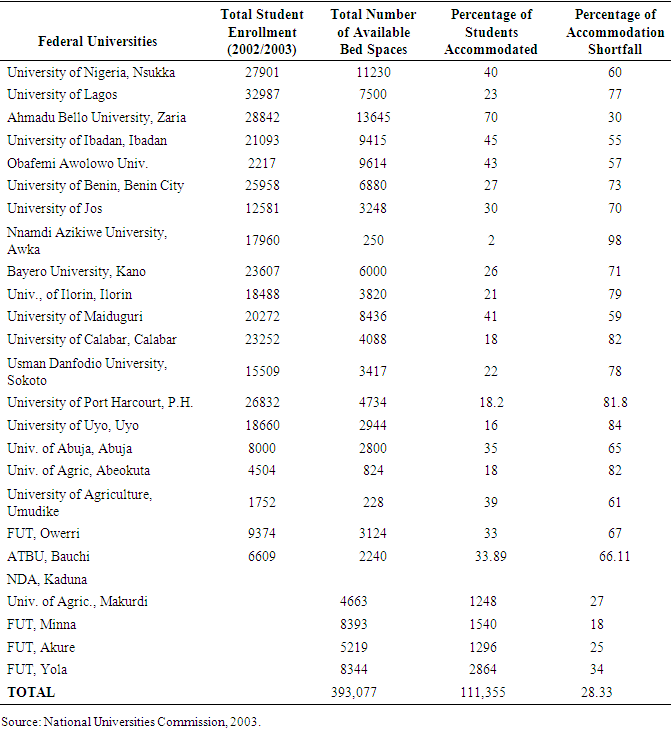 |
| |
|
2. The Concept of Student Housing and Facilities
The hostel is a cheap boarding accommodation facility provided for students. The hostel accommodation is conceived to keep students within the learning environment to facilitate ease of accessing the education facilities. Klis van der and Karsten (2008) described it as a dwelling, residence close to workplaces with dual functions: living and private studying. The student hostels, accommodation encourages social interactions among the students at all levels and enhances a lifelong familiarity (Lobatón, 2011). Hostel accommodation enables heterogeneous students to learn from each other and thereby promoting peer interactions required for human’ development (Novek et al., 2013). Through daily interactions among the peers the weak learning students improve their understanding ability and become focused as hostel accommodation reduces side attractions inimical to learning activity. The university environment affords students to participate in many social activities like sport, use of cafeteria and leadership training opportunities like student union and religion associations purposely for students without any barrier of background or exposure (Owolabi, 2015). The hostel facilities are meant to provide not only learning convenience, but also to enhance students' behavioural attitude needed for social interactions and leadership purposes. The provision of hostel accommodations enables the students of diverse culture and exposures to come together and enhances their academic and behavioural attitudes (Nimako & Bondinuba, 2013). Hostel facilities such as common room, parks, recreation garden, cafeteria, and internet cafe on the campuses encourages such attitudinal learning. In recent times, facilities such as campus shuttle-bus, mini-markets, corner shops, public toilets and security outfit are becoming necessary on the campuses (Owolabi, 2015). Living on the campus as a student in the University makes student’s lifestyle more refined and orderly and also gives the student a complete academic experience. The hostel accommodation allows students to learn, worship, and establishes many far reaching good relationship among their peers. Students’ accommodation influences their growth, behaviour and study performance (Devi, et al., 2015).A study conducted by Owolabi (2015) on the effects of Students’ Housing on Academic Performance at the University of Ibadan in Nigerian, the study revealed that hostel accommodation enhance academic success, especially among the students of poor background as it blend this category of students with the brilliant ones, improve students social value through enhanced interactions, expose students to resource management, and prepared students for self-reliance and leadership resilience.
2.1. Public Private Partnership in Provision of Hostel Facilities
A public-private partnership, PPP, is a legally binding contract between government and business for the provision of assets and the delivery of services that allocates responsibilities and business risks among the various partners. Oladimeji and Adebiyi (2017), conceptualizes PPP as a model of public procurement based on long term relationships between government or other public bodies and the private sector for the delivery of services. The growing enrollment of students in tertiary education over the past two decades made the governments involved private hostel providers to participate in the construction of hostel buildings and halls of residence for students in order to meet the demand for more accommodation. This has attracted many private individuals into investment in student hostel accommodation. A public private partnership is a legally-binding contract between government and business for the provision of assets and the delivery of services that allocates responsibilities and business risks among the various partners (British Colombia, 2003). Through this agreement, the skills and assets of each sector (public and private) are shared in delivering a service or facility for the use of the general public. In addition to the sharing of resources, each party shares in the risks and rewards potential in the delivery of the service. In some instance the management of such infrastructure is kept under the private partner for an agreed period of time to enable the private partner to recuperate its investment. Despite this innovation the problem of hostel accommodation and the poor maintenance of the existing hostels is far from being solved.
3. Research Method
The research design used was a descriptive survey with the application of a questionnaire and a well -structured observation schedule as an instrument for the collection of data. The research is basically based on Post Occupancy Evaluation of the existing hostels. Post Occupancy Evaluation is defined as a systematic evaluation of opinions about buildings, facilities and space in use, from the perspective of users (Watson, 2003). Therefore, the research instrument is adequate, and is to enable the students who are occupants of the hostels provide substantial information on their perception of the current facilities in their respective hostels and suggest their expectation on the design of hostels and facilities to be provided. Purposive sampling method was used in the selection of the Federal Universities in North Central Nigeria while stratified random sampling was applied in the selection of one hostel each of the campuses. 250 questionnaires were distributed and 180 were returned from the respondents which provide a return rate of 72%. The percentage of the returned rate is considered adequate for the study (Porter, 2004; Carley-Baxter, Hill, Roe, Twiddy, Baxter & Ruppenkamp, 2009). The analysis of the returned questionnaires was carried out by the use of descriptive statistics from SPSS, while the charts and tables generated in SPSS were further developed with the use of Microsoft Excel.
4. Results and Discussions
4.1. Status of the Hostels
The hostels and the facilities provided for the students were examined in the course of the fieldwork of this study. From the students’ responses on the status of the hostels as presented in Table 1.2 and as physically discovered in the course of administering the questionnaires, about 42.8% of the respondents which is the highest response described the hostels conditions as being bad. While 40.0% of the respondents described it as being fair. About 16.7% of the respondents agreed that the hostels and the facilities are in a very bad condition. About 6.0% of the students’ respondents described the hostels condition as being relatively good. A general observation also shows that most of these hostels and the facilities need serious maintenance works. The picture of a newly constructed hostel building in one of the universities visited is shown in Plate 1. The structure has started showing significant maintenance problem due to stress due to overbearing capacity of student population. Plate 2 is an abandon laundry condition due to poor facility conditions and Plate 3 is a relaxation arena of a hostel among the accommodations visited. Table 1.2. Status of the Hostels
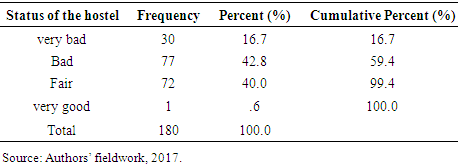 |
| |
|
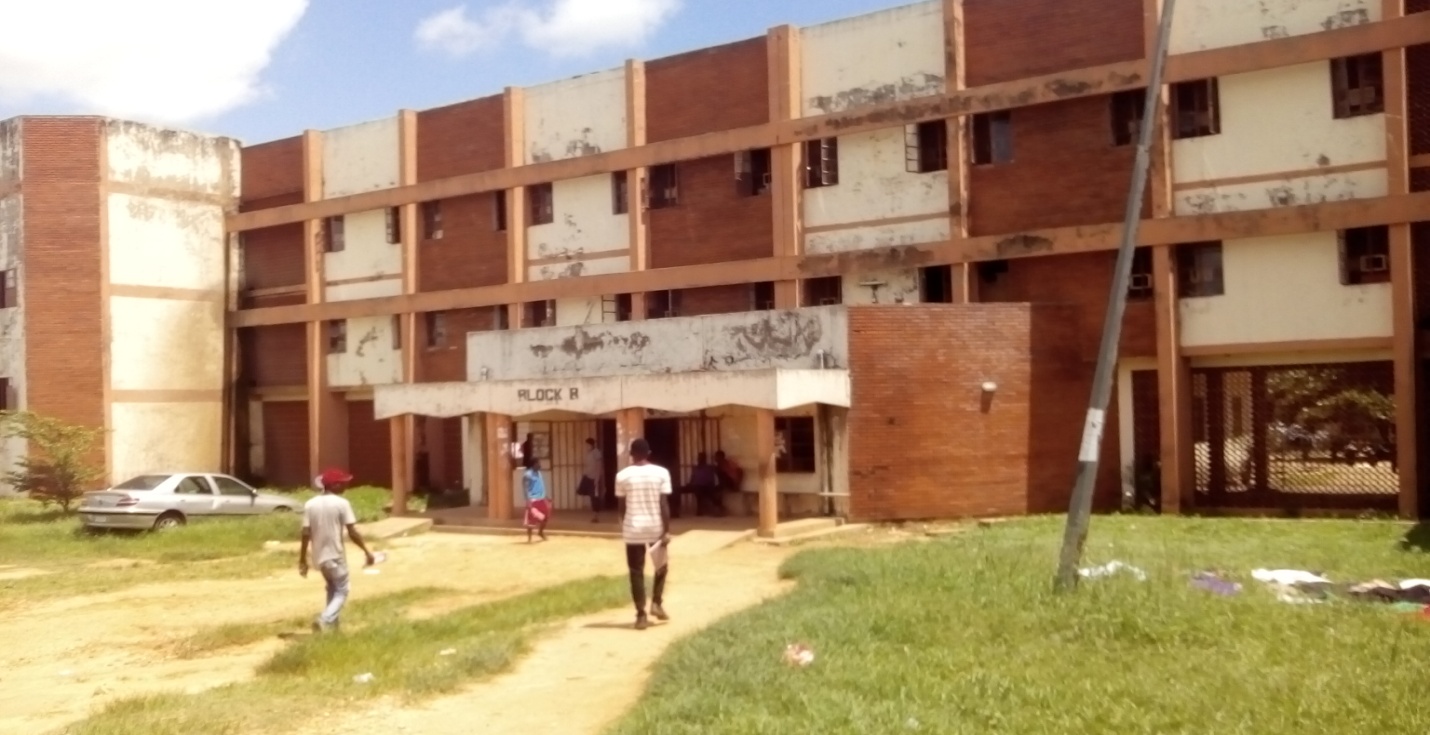 | Plate 1. Hostel Building façade in one of the Universities visited (Source: Authors’ fieldwork, 2017) |
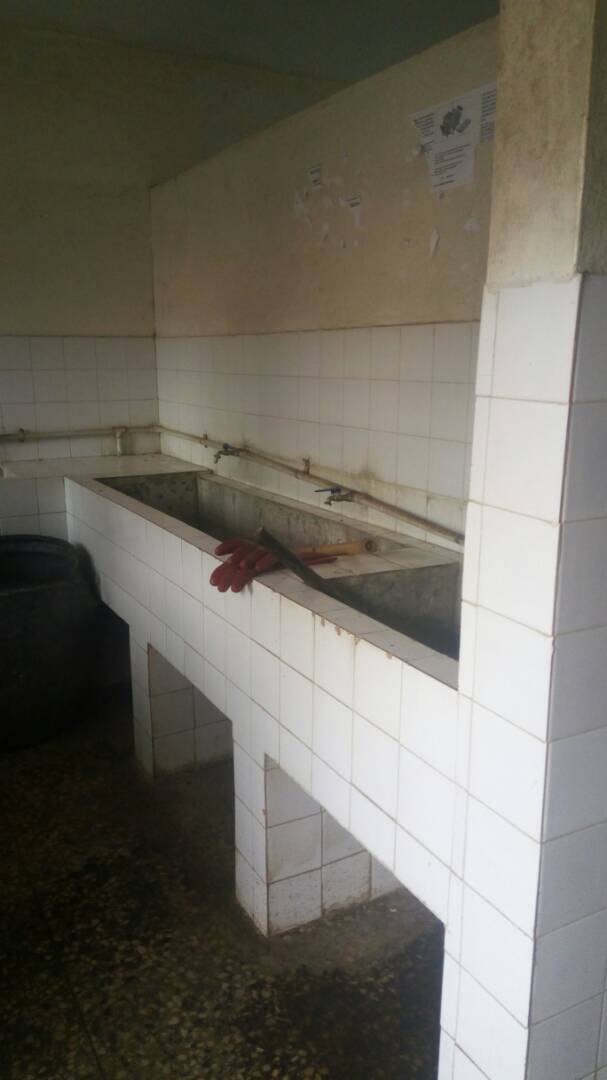 | Plate 2. A Laundry of a Hostel. (Source: Author’s fieldwork, 2017) |
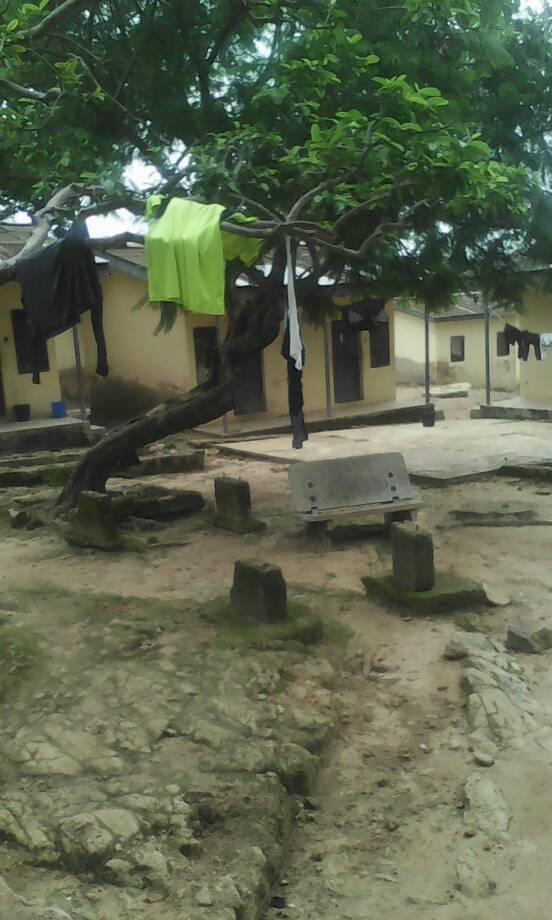 | Plate 3. Unhealthy Hostel Environment |
4.2. Students’ Satisfaction with the Hostels
Satisfaction evaluations were examined in order to determine the level of students’ satisfaction with the hostels and the facility conditions. From the responses gathered, 91.7% of the students are not satisfied with their hostel facilities while 8.3% of the respondents are satisfied with the hostel facilities. The result is presented in Table 1.3Table 1.3. Students Satisfaction with Hostel Facilities
 |
| |
|
4.3. Number of Students Per Study Room
The fieldwork shows that in most of the campuses visited, rooms that are designed for four (4) inmate students are being occupied by at least eight (8) students. Students without hostel accommodation and who could not afford off-campus accommodation usually arranges with and squat with a colleague. By doing so, each inmate who legally secured a bed space in a room meant for four inmates brings in a colleague each. This sum the total of the occupants of eight inmates thereby creating congestions and inconveniences to both the occupants and the hostel facilities. Congestion is detrimental to the health and well-being of the occupants as the safety of the indoor air quality in such environment cannot be guaranteed. Table 1.4 shows that 62.2% of the respondents agree that a hotel room should accommodate 3-4 students at maximum. About 37.2% of the respondents prefer 2 students per room. While 0.6% supported, 5-6 students per room. None of the respondents indicated more than 7 students per hotel room.Table 1.4. Number of Students per room in the Hostel
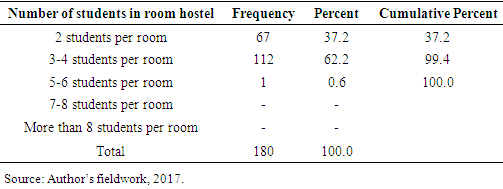 |
| |
|
The need to improve hostel facilities therefore calls for urgent attention as education cannot be conveniently pursued without adequate accommodation for the students. Most of the existing hostel facilities are dilapidated and the population of students kept increasing. This corroborates a similar finding by Owolabi (2015) who observed that hostel accommodation enhanced quality education and the academic life of a university student. The hostel facilities like toilet, laundry, kitchen, common room, availability of water and interruptible power supply with internet service are equally important in the hostel for the well-being of the students. Most often the cost of maintaining these facilities is always a source of concern to the management. This informed the reason for seeking the students’ opinion on a better way of maintaining these hostel facilities. The study analysis on the maintenance of the facilities shows that 45.0% of the respondents agree to bear the cost of replacing damage facilities where necessary, 34.4% of the respondents who disagreed were of the opinion that the universities usually charged the students for all the university facilities at the point of registration, and 18.3% of the respondents were undecided while negligible population of students of about 0.6% strongly agreed to paying for the cost of replacements where necessary. Table 1.5 shows the distribution of the respondents.Table 1.5. Response on Maintain and Hostel Facilities
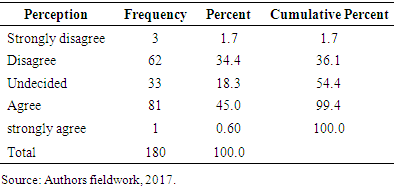 |
| |
|
4.3.1. Facilities Needed in the Hostels
Interaction with the students in the conduct of the study shows that additional facilities required by the students in most of the universities include interruptible power supply, efficient internet facility, on-campus security, cafeteria and recreational facility, constant water supply to the hostel toilets, wardrobe, cupboard for safe keeping of individual belongings and more hostel building. Table 1.6 presents the distribution of the student population on these needed facilities.Table 1.6. Facilities Needed in the Hostels
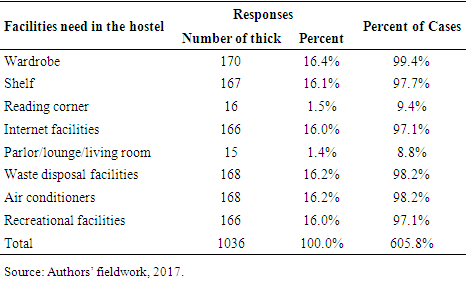 |
| |
|
5. Recommendations
In view of the fact that the most needed facilities in hostel accommodation as prioritized by the students in their living space include wardrobe, shelf, internet, waste disposal, air conditioner, and recreational facilities in a safe and secured environment in the north central region of Nigeria as discovered by the study the following recommendations are forwarded; 1. Public private partnership, contractual agreement for university hostel development should be based on building and operate by the developers in a way that would allow the developers to dispose the property to the university after an agreeable time. This would make the arrangement attractive to interested developers, rather than the present arrangement based on building operate and transfer (BOT) which is not favourable to many investors. The university management would only regulate the cost of taking a space in this category of hostels.2. Hostel space design should be more flexible to accommodate more student population and should not be allowed to accommodate beyond the maximum student population.3. Universities with vast expanse of land could designate certain portions of the land for interested developers to building a hostel accommodation. This is to distinguish public property of a university away from personal property meant for public goods within the university. Such area within the university land expanse could be regarded as students’ village.4. University hostel facility should not be based on hierarchical category as every student should be placed on the same level of treatment and provisions.5. The student population has been the major source of overstressing and poor maintenance of the hostel facilities effective management can be achieved through commercialization of the hostels. 6. Post Occupancy Evaluation of the hostels should be conducted on a periodical basis to facilitate repairs, improvement and expansions of the hostel facilities.
5.1. Conclusions
Hostels provisions cannot be divorced from university education. The provision of adequate students’ hostel accommodation should therefore be among the major facilities of a university setting. The capital requirements could be share among the stakeholders through Public private partnership, PPP and should not be run for profit making. The poor state of the hostel facilities would rather make a hostel looks like a shelter and would seriously affect the quality of education and the psychology of the student toward distinguishing between standard and ordinary facility in a larger society. Hostel provision should be sustained in University settings and a University must not be allowed to operate without adequate provisions of hostel accommodations on its campus. The hotel accommodations have been found to affect the academic lifestyle of the students as it makes students to be focused and concentrating to study. Therefore the hostel accommodations of universities in the North central Region of Nigeria require urgent attention.
References
| [1] | Abramson, P. (2009). Living on campus, downsizing residence halls: Space and costs. College Plan. Manage. Mag., 12. Retrieved from www.peterli.com/cpm/pdfs/CollegeHousing2009.pdf. On 11/06/2017. |
| [2] | Amina, I. & Asir, A. (2017). A qualitative Study Investigating the Impact of Hostel Life. International Journal of Emergency Mental Health and Human Resilience 17(2), 1522 – 4821. |
| [3] | Amole, D. (2009). Residential Satisfaction in Students' Housing. Journal of Environmental Psychology. 29, 76-85. |
| [4] | Amole, O.O. (1998). The Challenge of Student Housing in Nigeria. Journal of Environmental Design and Management, 1(1), 35-47. |
| [5] | British Columbia (2003). An Introduction to Public Private Partnerships. Retrieved from http://www.partnershipsbc.ca/pdf/An%20Introduction%20to%20P3%20-June03.pdf. On 10/07/2018. |
| [6] | Carley-Baxter, L. R., Hill, C.A., Roe, D. J., Twiddy, S. E., Baxter, R. K. and Ruppen kamp, J. (2009). Does Response Rate Matter? Journal Editors Use of Survey Quality Measures in Manuscript Publication Decisions. Survey Practice, 2(7), 1-7. |
| [7] | Devi, V.; Ashari, SNBM; Rashid, SBA; Adlan, MABN; & Musadiq, MMBM. (2015). Cost benefit and risks associated with in-campus and off-campus accommodations of medical students: a cross-sectional study. International Journal of Pharmacol. and Clin. Sci., 4(3), 58-62. |
| [8] | Emmanuel, A. (2015). Students’ Hostel User’s Spatial Needs and Aspirations. Unpublished Master’s thesis, submitted to the Department of Architecture, Federal University of Technology, Yola. |
| [9] | Eziyi, O.I & Egidaro, B.A. (2012). Public – Private Partnership in Urban Housing in Nigeria: Evidence from Ogun State Nigeria. International Journal of Architecture and Urban Development, 2, 67-80. |
| [10] | Hassanain, M.A., (2008). Performance Evaluation of Sustainable Student Housing Facilities, Journal of facilities management (6)3, 212-225. |
| [11] | Klis van der, M. and Karsten, L. (2008). Commuting Partner’s dual Residences and the Meaning of Home. J. Environ. Psychol., 29, 235-245. DOI:10.1016/j.jenvp.2008.11.002. |
| [12] | Lobatón, J.C.G (2011). Peer Interaction: A Social Perspective towards the Development of Foreign Language Learning. PROFILE 13(1), 189-203. ISSN 1657-0790. |
| [13] | Mansoor, U.L. & Hussain, M.A. (2015). Impact of Hostel Students’ Satisfaction on their Academic Performance in Sri Lankan Universities. 5th International Symposium held in Sri Lankan. |
| [14] | Mary, A. & Akuakuanwa, N. (2015). Students’ Satisfaction with Hostel Facilities in Federal University of Technology Akure Nigeria. European Scientific Journal 11(34), 1857 – 7881. |
| [15] | National University Commission, Monogragh series Abuja, (2003). (1)4. |
| [16] | Nimako, S.G. & Bondinuba, F.K. (2013). Relative Importance of Student Accommodation Quality in Higher Education. Current Research Journal of Social Sciences 5(4): 134-142. |
| [17] | Novek, S; Menec, V.;Tran, T. ;Bell, S.(2013). SOCIAL PARTICIPATION AND ITS BENEFITS. Centre on Aging, University of Manitoba. |
| [18] | Ogadinma, C. A. (2013). Cohabitation among University Students, Journal of Humanities and Social Sciences. 2222 – 2863 (3)5. 2222 – 1719. |
| [19] | Oladimeji, A.B; Adebiyi A.O & Gambo, M.D. (2017). Public – Private – Partnership; A Panacea to the Problems of Infrastructure Development in Nigeria. International Journal of Sciences, Engineering and Environmental Technology 2(4), 0794 – 9650. |
| [20] | Owolabi, B.O. (2015). The Effects of Students’ Housing on Academic Performance at the University of Ibadan in Nigerian. International Journal of Scientific & Engineering Research. 6(3), 1118-1132. |






 Abstract
Abstract Reference
Reference Full-Text PDF
Full-Text PDF Full-text HTML
Full-text HTML




